Both influencer marketing and affiliate marketing are ways to promote a product or service, but there are key differences between the two. Influencer marketing relies on celebrities or influential people to tout a product, while affiliate marketing uses affiliates (independent contractors) to promote products in exchange for sales commissions. Let’s take a closer look at these two marketing methods and see which is best for your business.
Definitions
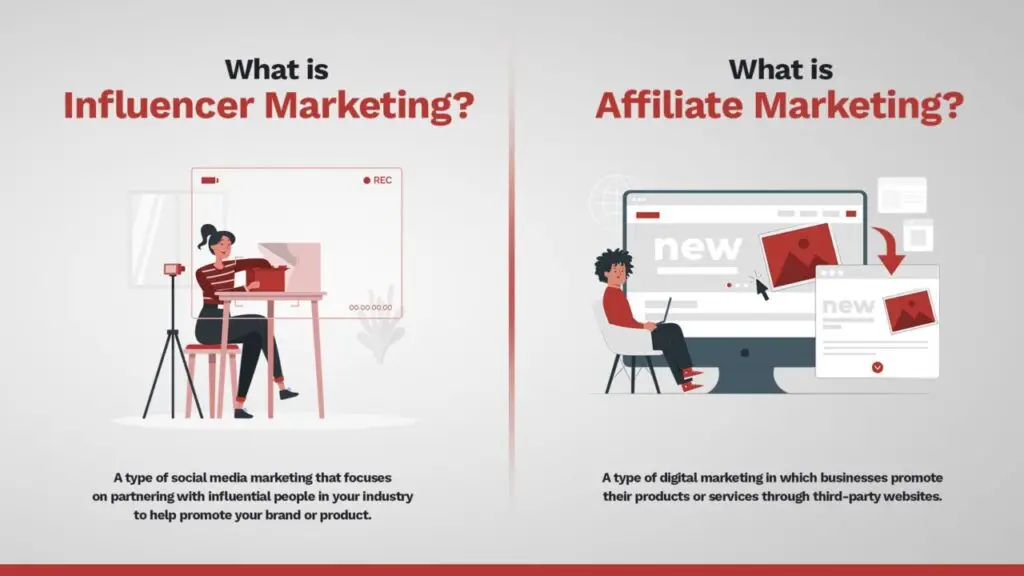
What Is Influencer Marketing?
Influencer marketing is a type of social media marketing that focuses on partnering with influential people in your industry to help promote your brand or product. Influencers typically have a large following on social media, and their endorsement can help to increase brand awareness and drive sales.
Influencer marketing can effectively reach a larger audience, but it’s important to choose influencers who are a good fit for your brand and who will resonate with your target audience. When done correctly, influencer marketing can be a powerful tool for driving growth and reaching new customers.
What Is Affiliate Marketing?
Affiliate marketing is a type of digital marketing in which businesses promote their products or services through third-party websites. These websites, known as affiliates, earn a commission for every sale they generate. Affiliate marketing is an effective way for businesses to reach new customers, and it can also be used to boost sales of existing products.
In order to succeed in affiliate marketing, businesses need to choose the right affiliates and offer them attractive commissions. They also need to create high-quality content that will persuade visitors to click on the affiliate links and make a purchase. With careful planning and execution, affiliate marketing can be a powerful tool for driving sales and expanding a business’s customer base.
How To Start Influencer Marketing Campaigns?
You’re convinced that influencer marketing is the right move for your brand. Now, it’s time to start planning your campaign. But where do you begin? You’ll need to take a few key steps to get your influencer marketing campaign off the ground.
First, you’ll need to identify your goals. What do you want to achieve with your campaign? Are you looking to increase brand awareness, drive traffic to your website, or boost sales? Once you know what you want to accomplish, you can start to identify the right influencers to partner with. Look for influencers who have a sizable following in your target demographic and who align with your brand’s values.
Next, reach out to the influencers you’ve selected and let them know what you have in mind. If they’re interested in working with you, provide them with all the details of your campaign, including what you’ll be offering in exchange for their participation. Once everything is finalized, it’s time to launch your campaign and start seeing results!
How To Start Affiliate Marketing Campaigns?
Before you begin an affiliate marketing campaign, it’s important to research the company and products that you’ll be promoting. This will help you to better understand the customer’s needs and how you can best meet them. Once you understand the products well, it’s time to start creating content that will promote them.
This can be in the form of blog posts, social media posts, or even creating videos that show off the products in use. As you create content, include links to the company’s website so interested customers can learn more and make a purchase. By taking the time to properly research and create engaging content, you’ll be off to a great start with your affiliate marketing campaign.
Marketing Strategy For Influencer Marketing
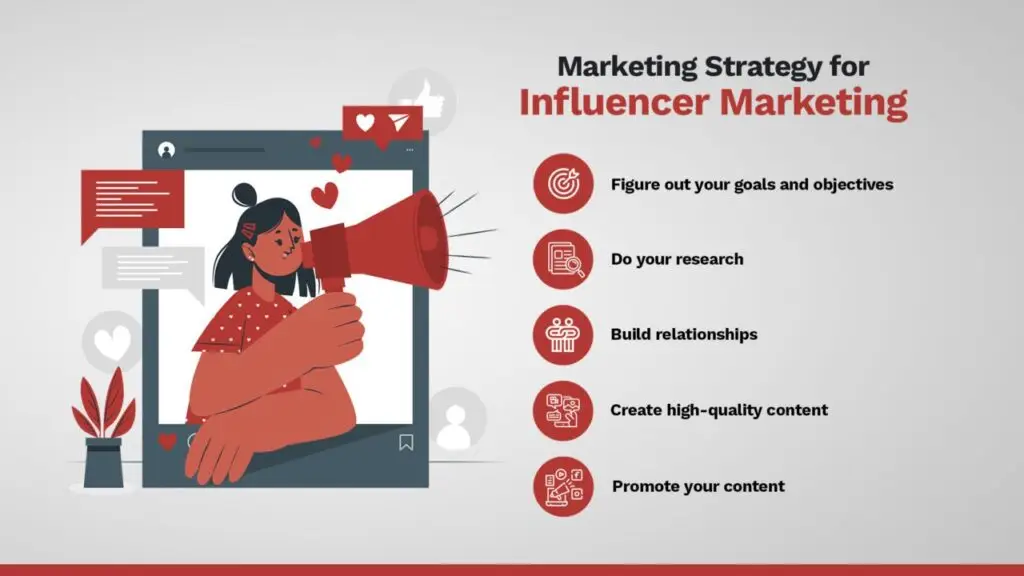
If you’re looking to get involved in influencer marketing, or even if you’re already doing it, there are some important things to keep in mind when it comes to strategy. Here are four key components of a successful influencer marketing strategy:
Figure Out Your Goals
Before you start reaching out to potential influencers, take some time to figure out what you want to achieve with your influencer marketing campaign. Do you want to increase brand awareness? Drive traffic to your website? Boost sales?
Once you know your goals, you can start developing a strategy for achieving them. For example, if you want to increase brand awareness, you’ll need to identify influencers who have a large following and are relevant to your industry. If you want to drive traffic to your website, you’ll need to work with influencers with an engaged audience willing to promote your content.
Do Your Research
Before you start working with any influencer, it’s important to do your research. This means taking the time to learn about their audience, their platform, and their content.
This will help you determine whether or not they’re a good fit for your brand and your campaign goals. It will also give you some insight into what kind of content they typically share and how they like to work with brands.
Build Relationships
Influencer marketing is all about relationships. The better your relationship with an influencer, the more likely they will promote your content and help you achieve your campaign goals.
That’s why it’s important to take the time to build relationships with potential influencers before you start working with them. Get to know them and their audience. Share their content and give them feedback. The better you know them, the more likely they are to want to work with you.
Create High-quality Content
If you want your influencer marketing campaign to be successful, you need to create high-quality content that your target audience will actually want to consume. This means creating something interesting, informative, and shareable.
It also needs to be well-designed and visually appealing. Remember, you’re competing for attention against all the other content that’s out there, so you need to make sure your content stands out.
Promote Your Content
Once you’ve created high-quality content, it’s important to promote it to ensure that as many people see it as possible. There are a number of ways to do this, including social media, email marketing, and paid advertising.
Which method you use will depend on your goals and your audience. But regardless of which method you choose, promoting your content is essential if you want your influencer marketing campaign to be successful.
Marketing Strategy For Affiliate Marketing
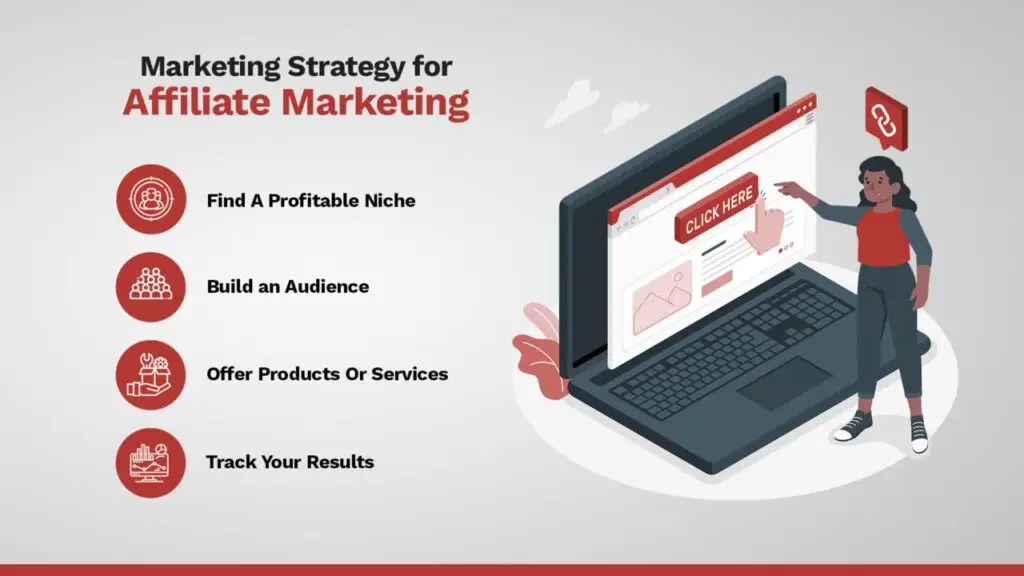
Affiliate marketing has been around for a long time and is one of the most effective ways to earn money online. However, many people don’t know how to get started with affiliate marketing or get discouraged because they don’t see results immediately.
The key to affiliate marketing success is finding the right niche, building an audience, and then offering products or services that your audience is interested in. If you can do this, you’ll be able to make a full-time income from affiliate marketing.
To help you get started, here’s a step-by-step guide to affiliate marketing:
Find A Profitable Niche
One of the most important steps in affiliate marketing is finding a profitable niche. This is the group of people that you’ll be marketing to, and they need to be interested in what you’re selling.
You can start by thinking about your hobbies or interests to find a profitable niche. What are you passionate about? What do you know a lot about? These are all great places to start when it comes to finding a niche.
Another option is to look at trends in your industry. What products or services are people talking about? What’s hot right now? These are all great niches to consider pursuing.
Build an Audience
Once you’ve found a niche, raising brand awareness by building an audience is next. This can be done in a number of ways, but the most common method is to start a blog or website.
When you have a blog or website, you can offer valuable content to your audience that will help them learn more about your niche. You can also use this platform to promote products or services that you’re an affiliate for.
Another great way to build an audience is through social media. If you’re active on platforms like Twitter, Facebook, and Instagram, you can share your content with a wider audience and attract new followers.
Offer Products Or Services
Once you’ve built an audience, the next step is offering them products or services they’re interested in. This is where affiliate marketing comes in.
You’ll promote products or services as an affiliate on your blog or website. You’ll earn a commission when someone clicks on one of your links and makes a purchase.
The key to success with affiliate marketing is to find products or services that your audience is interested in and then promote them in a helpful and informative way. If you can do this, you’ll be able to make sales and earn commissions.
Track Your Results
Finally, it’s important to track your results so that you can see what’s working and what isn’t. This will help you fine-tune your strategy and make more money over time.
There are a number of ways to track your results, but one of the most important is to use analytics. Google Analytics is a free tool that you can use to track your website traffic and see where it’s coming from.
This information will help you understand which of your marketing efforts are working and which ones aren’t. You can then adjust your strategy accordingly and continue to grow your business.
Affiliate marketing is a great way to earn money online, but it takes time and effort to be successful. However, if you’re willing to put in the work, you can build a profitable business that will provide you with a full-time income.
Follow these steps, and you’ll be on your way to success with affiliate marketing.
Difference Between Affiliate And Influencer Marketing
Influencer and affiliate marketing are both popular online marketing strategies that can be used to earn money online. Both involve promoting products or services for companies in exchange for a commission on sales, but there are some key differences between the two.
Affiliate marketing is typically done through social media engagement that promotes a particular product or service. Influencer marketing, on the other hand, relies heavily on social media platforms like Instagram, YouTube, and Snapchat to reach a wider audience. Affiliate marketing also helps health and fitness publishers.
Influencer marketing is also generally more expensive than affiliate marketing since influencers usually charge for their posts. However, many brands feel that the extra cost is worth it because of the increased reach and engagement that influencer marketing provides.
At the end of the day, both affiliate marketing and influencer marketing can be effective ways to earn money online. The best strategy for you will depend on your budget, your audience, and your goals.
Pros and Cons of Affiliate Marketing
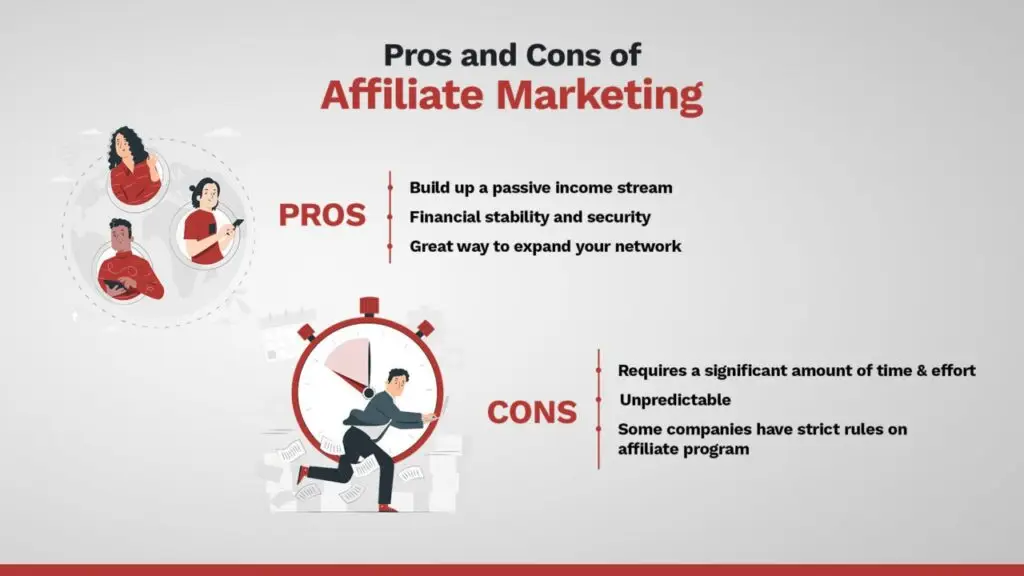
Pros
There are many benefits of affiliate marketing. For one, it’s a great way to earn money online passively. This means that you can make money while you sleep! All you need to do is promote other people’s products and services and earn a commission on each sale that you generate. Additionally, affiliate marketing is a great way to build up a passive income stream.
This can provide you with financial stability and security in the long term. Finally, affiliate marketing can be a great way to connect with new people and expand your network. By promoting products and services that you’re passionate about, you can build relationships with like-minded individuals who may be interested in what you have to offer.
Overall, affiliate marketing is a great way to earn money online and build long-term passive income streams. Pay Affiliates can help with lead generation. Additionally, it also helps social media influencers with brand exposure.
Cons
While affiliate marketing can be a great way to earn money, there are some potential drawbacks that should be considered before getting started. First, affiliate marketing requires a significant amount of time and effort to be successful. In order to find and promote products, affiliates need to spend time researching and building relationships with potential customers.
Additionally, affiliate marketing can be unpredictable; even the best-performing campaigns can suddenly stop generating income, leaving affiliates feeling frustrated and disappointed. Finally, some companies have strict rules about how an affiliate program can promote their products, which can make it difficult to create an effective marketing strategy.
Despite these potential drawbacks, affiliate marketing can be a great way to earn money online. With careful planning and execution, it is possible to build a successful business by promoting the products of other companies.
Pros and Cons of Influencer Marketing
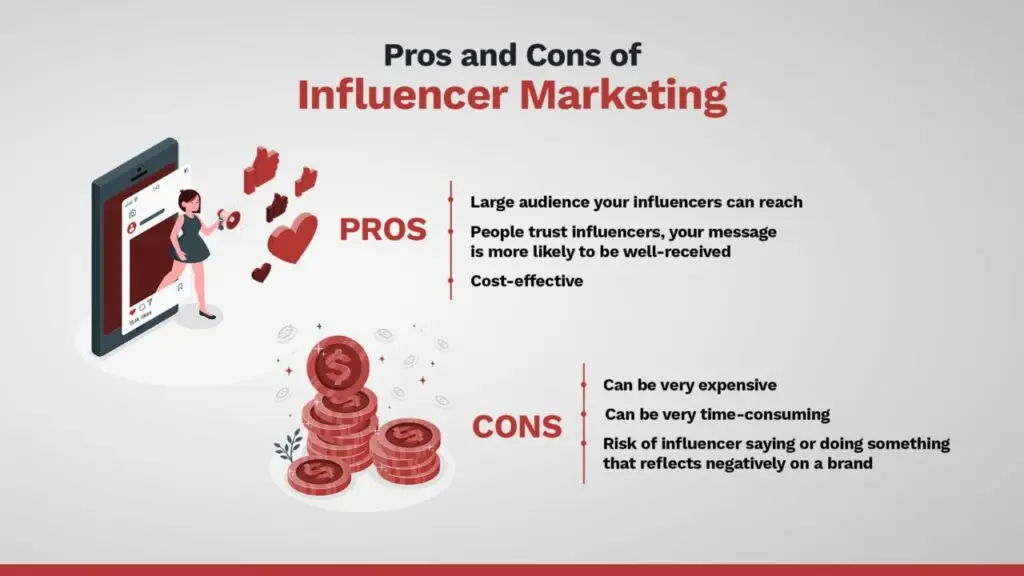
Pros
In recent years, influencer marketing has become an increasingly popular promotion strategy. As the name suggests, influencer marketing involves working with influential people to promote your brand or product. There are a number of advantages to using this type of marketing.
First, influencers have a large audience that they can reach with your message. Second, because people trust influencers, your message is more likely to be well-received by their followers. Finally, influencer marketing can be relatively cost-effective, especially compared to traditional advertising forms such as television and print ads. Influencer marketing may be the right solution for you if you’re looking for a way to reach a large audience with your marketing message.
Cons
One of the key cons of influencer marketing is that it can be very expensive. Brands are often willing to pay top-tier influencers large sums of money to promote their products or services. This can price out smaller brands and businesses that may not have the same marketing budget.
Additionally, influencer marketing can be very time-consuming. In order to find the right influencers and develop relationships with them, brands need to be prepared to commit a significant amount of resources. Finally, there is always the risk that an influencer will say or do something that reflects negatively on a brand.
While this is relatively rare, it can happen, and it can damage a brand’s reputation. For these reasons, influencer marketing is not right for every brand or business. Careful consideration should be given before making the decision to pursue this type of marketing.
Conclusion
In conclusion, it’s important to understand the difference between influencer marketing and affiliate marketing. Influencers are people with a large following on social media or other online platforms who can sway public opinion. Affiliates are people who have an agreement with a company to promote and sell their products in exchange for a commission on sales.
Both strategies have their pros and cons, but ultimately it comes down to what will work best for your business. Have you tried using affiliates? What has been your experience? Or alternatively, have you worked with influencers? If so, what was the outcome? We would love to hear about your experiences in the comments below.
